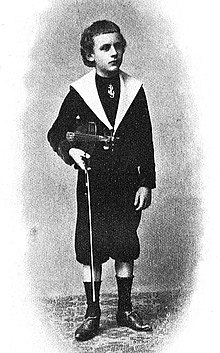Martin Collin
Martin Collin (born November 1, 1882 in Stettin ; † July 13, 1906 in Todtnau ) was a German violinist .
Collin grew up as the son of a conductor who worked at the city theater in Stettin and a mother who was a singer, together with three siblings in a musical environment. In his childhood the family moved to Nuremberg . There, at the age of six, Collin received his first violin lessons from the concertmaster Blankensee. Collin made his first major appearance in Nuremberg on Good Friday 1891. The main number was the Faust Symphony with a choir by Franz Liszt . For this major event, the theater was converted into a concert hall. Collin played Charles-Auguste de Bériot 's Concerto in D major with orchestral accompaniment. Franz Kaim , who was present in the concert hall, wanted to sign Collin to Munich and to finance a European tour, Councilor Eugen Frankfurter. However, out of concern for their son, the parents declined these offers.
Soon after, the family moved to Strasbourg . There Collin attended secondary school. Heinrich Schuster a German violinist and music teacher became his teacher and mentor. As such, he campaigned for Collin to be accepted into the municipal conservatory . Collin received a scholarship from the governor of the realm of Alsace-Lorraine , Prince Hermann zu Hohenlohe-Langenburg and from the mayor of Strasbourg.
On December 9, 1894, Collin played on a violin made by Carlo Giuseppe Testore (1665-1738), 1732, a concerto by Charles-Auguste de Bériot in A major, and an elegy by Heinrich Wilhelm Ernst and the Spanish Dances by Pablo de Sarasate . Collin was also called "Geiger-Prinz" and "Paganini II".
In 1895, Collins' father was appointed second Kapellmeister at the Stadttheater Basel . In the first year Collin played in the Basel Symphony Orchestra under the concertmaster Adolf Bargheer (1840–1901). This was the brother of Carl Bargheer .
In 1898, Hans Huber Collin wrote a letter of recommendation for the Basel Concert Society, which was supposed to encourage them to hire Collin as a soloist. A year later, Collin was appointed concertmaster for the summer season in Baden-Baden . There Hugo Hermann heard him who wanted to sign Collin to Frankfurt am Main , but he refused. Back in Basel, his father allowed him to take violin lessons from Edmund Singer and counterpoint lessons from Samuel de Lange (1840–1911) in Stuttgart .
Out of his crush on Beethoven's violin quartet, he founded the "Collin Quartet". This included Alfred Weckherlin (viola), Richard Heberlin (violin II), Alois Rieger (cello) and Collin as first violinist. The quartet performed with great success in 1902 and 1904 at various locations in Bavaria and Switzerland .
While his father quit his job as Kapellmeister in 1902 after seven years at the Stadttheater and performed with a traveling drama group in Holland and Russia , Collin stayed in Basel where he stayed under poor conditions a. a. if he suffered from malnutrition, had to live.
After he gave a successful concert with friends on May 27, 1906 in the St. Matthew Church in Kleinbasel , Collin fell seriously ill with pneumonia, which was treated too late .
When he was in Todtnau for a cure, he died on July 13th in the arms of his father, who happened to be there. Martin Collin was buried on July 15th in the Todtnau cemetery.
literature
- Hans Baur: Martin Collin, an early man. Part 1 . Part 2. In: Schweizer Illustrierte , Vol. 10, 1906.
Individual evidence
- ↑ Basel Symphony Orchestra, Adolf and Carl Bargheer
| personal data | |
|---|---|
| SURNAME | Collin, Martin |
| BRIEF DESCRIPTION | German violinist |
| DATE OF BIRTH | November 1, 1882 |
| PLACE OF BIRTH | Szczecin |
| DATE OF DEATH | July 13, 1906 |
| Place of death | Todtnau |

